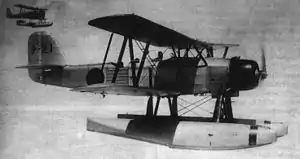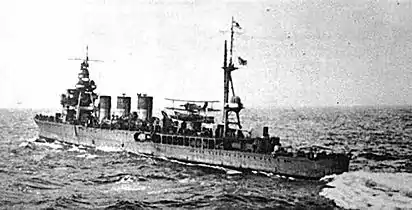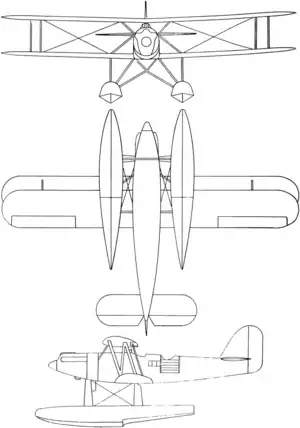Kawanishi E7K
The Kawanishi E7K was a Japanese three-seat reconnaissance seaplane mainly in use during the 1930s. It was allocated the reporting name Alf by the Allies of World War II.
| E7K | |
|---|---|
 | |
| Role | reconnaissance floatplane |
| Manufacturer | Kawanishi Aircraft Company |
| First flight | 6 February 1933 |
| Introduction | 1935 |
| Retired | 1943 |
| Primary user | IJN Air Service |
| Number built | 533 |
Design and development
In 1932 the Imperial Japanese Navy requested the Kawanishi Aircraft Company produce a replacement for the company's Kawanishi E5K. The resulting design, designated the Kawanishi E7K1, was an equal span biplane powered by a 462 kW (620 hp) Hiro Type 91 W-12 liquid-cooled inline engine. The first aircraft flew on 6 February 1933 and was handed over to the navy for trials three months later. It was flown in competition with the Aichi AB-6 which was designed to meet the same 7-Shi requirement.[1] The E7K1 was ordered into production as the Navy Type 94 Reconnaissance Seaplane (九四式水上偵察機) and entered service in early 1935. It became a popular aircraft, but was hindered by the unreliability of the Hiro engine. Later production E7K1s were fitted with a more powerful version of the Hiro 91, but this did not improve the reliability. In 1938 Kawanishi developed an improved E7K2 with a Mitsubishi Zuisei 11 radial engine, it first flew in August 1938 and was ordered by the Navy as the Navy Type 94 Reconnaissance Seaplane Model 2. The earlier E7K1 was renamed to Navy Type 94 Reconnaissance Seaplane Model 1.
Operational history

The type was used extensively by the Japanese Navy from 1938 until the beginning of the Pacific War, when E7K1 were relegated to second-line duties. The E7K2 continued in front-line service until 1943 and both versions were used in kamikaze operations during the closing stages of the war.
Variants
- E7K1
- Production version with a Hiro Type 91 520 hp water-cooled W-12 engine, 183 built (including 57 built by Nippon Hikoki K.K.)
- E7K2
- Re-engined version with a Mitsubishi Zuisei 11 radial engine, about 350 built (including 60 built by Nippon Hikoki K.K.)
Specifications (E7K2)

Data from Japanese Aircraft of the Pacific War,[2][3]
General characteristics
- Crew: 3
- Length: 10.41 m (34 ft 2 in)
- Wingspan: 14 m (45 ft 11 in)
- Height: 4.85 m (15 ft 11 in)
- Wing area: 43.6 m2 (469 sq ft)
- Empty weight: 2,100 kg (4,630 lb)
- Gross weight: 3,300 kg (7,275 lb)
- Powerplant: 1 × Mitsubishi MK2 Zuisei 11 14-cylinder air-cooled radial piston engine, 650 kW (870 hp) for take-off
- 630 kW (850 hp) at 2,300 m (7,546 ft)
- Propellers: 2-bladed metal propeller
Performance
- Maximum speed: 276 km/h (171 mph, 149 kn) at 2,000 m (6,562 ft)
- Cruise speed: 185 km/h (115 mph, 100 kn) at 1,000 m (3,281 ft)
- Endurance: 11 hours 19 minutes
- Time to altitude: 3,000 m (9,843 ft) in 9 minutes 6 seconds
- Wing loading: 75.7 kg/m2 (15.5 lb/sq ft)
- Power/mass: 0.196 kW/kg (0.119 hp/lb)
Armament
- Guns: 1× fixed Type 97 aircraft machine gun (Vickers) and 2× trainable 7.7 mm (0.303 in) Type 92 machine guns (Lewis gun), one dorsal, one ventral
- Bombs: 120 kg (264.6 lb) of bombs
See also
Aircraft of comparable role, configuration, and era
Related lists
References
- Notes
- Green 1962, p. 121.
- Francillon 1979, p. 300
- Green 1962, p. 123
- Bibliography
- Francillon, René J. (1979). Japanese aircraft of the Pacific War. London: Putnam. ISBN 0-370-30251-6. OCLC 6124909. (new edition 1987 by Putnam Aeronautical Books, ISBN 0-85177-801-1.)
- Green, William (1962). War Planes of the Second World War. v. 6. Macdonald & Co. ISBN 0-356-01450-9. OCLC 654973389.
- Unknown Author. The Illustrated Encyclopedia of Aircraft (Part Work 1982-1985). Orbis Publishing, 1982–1985.